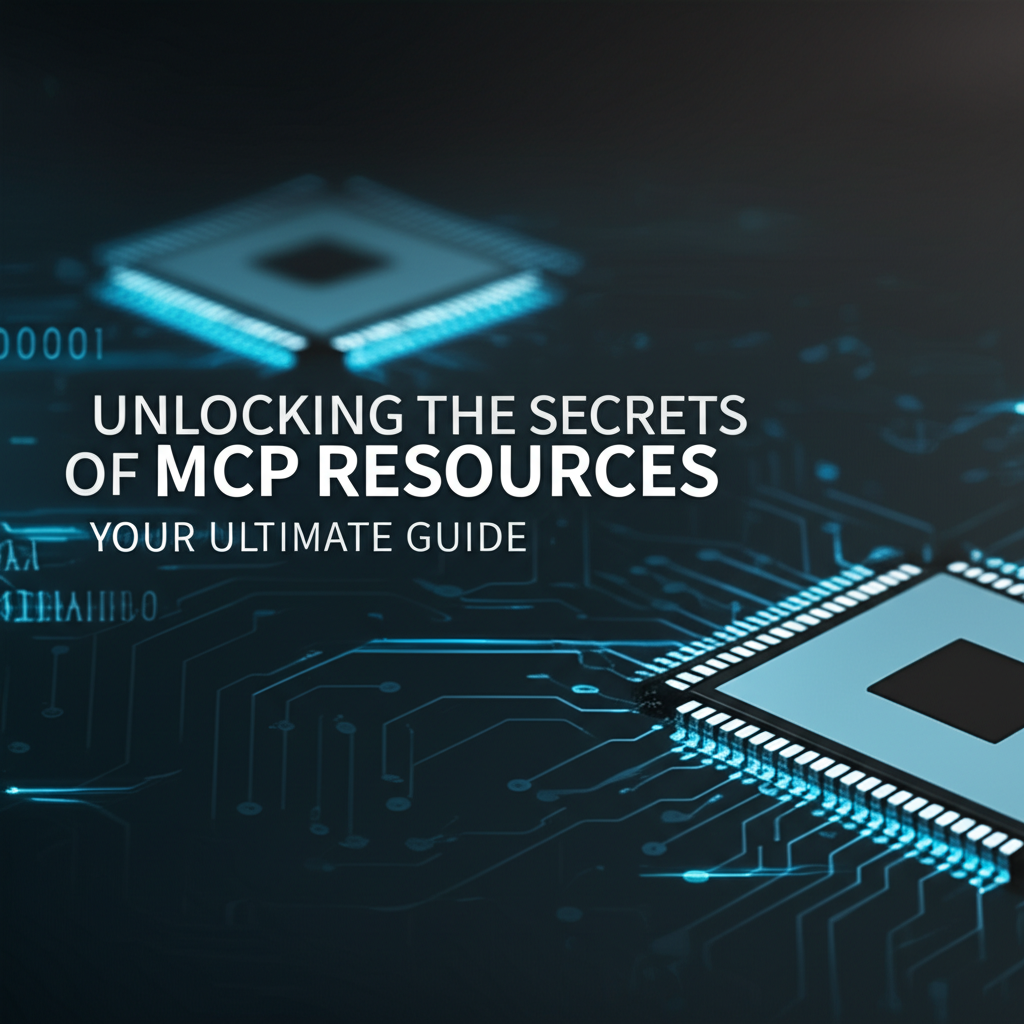Unlocking the Secrets of MCP Resources: Your Ultimate Guide

Build AI Agents With Incredible MCP
Introduction
In the rapidly evolving landscape of artificial intelligence, the Model Context Protocol (MCP) has emerged as a game-changer for AI agents. MCP resources, which include platforms and tools, are pivotal in enabling AI agents to connect with a vast array of real-world data sources and tools seamlessly. This article delves into the intricacies of MCP resources, offering an in-depth guide to help you navigate this transformative technology. We will explore the benefits of MCP platforms, the essential tools available, and how they can empower AI agents to achieve new heights of efficiency and effectiveness.
Understanding MCP
What is MCP?
Model Context Protocol (MCP) is a standardized framework designed to facilitate the integration of AI agents with various data sources and tools. It acts as a bridge, allowing AI agents to access and utilize a wide range of information without the need for complex configurations or custom integrations.
The Importance of MCP
The significance of MCP lies in its ability to streamline the process of data integration for AI agents. By providing a unified protocol, MCP simplifies the development and deployment of AI solutions, making it easier for businesses and developers to leverage the power of AI.
Exploring MCP Platforms
What is an MCP Platform?
An MCP platform is a comprehensive software solution that provides the infrastructure necessary for AI agents to connect with external data sources and tools. These platforms are designed to be scalable, secure, and user-friendly, ensuring that AI agents can operate efficiently across different environments.
Top MCP Platforms
- XPack.AI
- XPack.AI is a cutting-edge MCP platform that enables AI agents to connect with thousands of real-world data sources and tools in under a minute. It offers faster performance, lower costs, and a superior user experience with minimal configuration.
- Key Features:
- Real-time data integration
- Advanced security measures
- User-friendly interface
- Extensive library of data sources and tools
- AIConnect
- AIConnect is another prominent MCP platform known for its robustness and flexibility. It supports a wide range of data sources and tools, making it an ideal choice for organizations with diverse AI needs.
- Key Features:
- Comprehensive data support
- Customizable workflows
- Integration with existing systems
- High-performance architecture
- DataBridge
- DataBridge is a versatile MCP platform that focuses on simplicity and ease of use. It is particularly well-suited for small to medium-sized businesses looking to implement AI solutions without extensive technical expertise.
- Key Features:
- Intuitive interface
- Quick setup
- Cost-effective
- Reliable support
XPack is an incredible MCP platform that empowers your AI Agent to connect with thousands of real-world data sources and tools in under a minute. Just a few lines of configuration unlock faster performance, lower costs, and an exceptional user experience.Try XPack now! 👇👇👇
Essential MCP Tools
Data Integration Tools
Data integration tools are crucial for connecting AI agents with external data sources. These tools enable the seamless flow of data between different systems, ensuring that AI agents have access to the information they need to perform their tasks effectively.
- Data Mapper
- Data Mapper is a powerful tool that allows users to map and transform data between different formats and structures. It is particularly useful for ensuring compatibility between various data sources and AI agents.
- Key Features:
- Support for multiple data formats
- Customizable mapping rules
- Real-time data transformation
- User-friendly interface
- API Connector
- API Connector is a versatile tool that enables AI agents to access data from external APIs. It simplifies the process of integrating third-party services and data sources into AI workflows.
- Key Features:
- Support for a wide range of APIs
- Secure authentication
- Real-time data retrieval
- Customizable request parameters
Data Analysis Tools
Data analysis tools are essential for extracting meaningful insights from the vast amounts of data available to AI agents. These tools help in identifying patterns, trends, and anomalies, enabling AI agents to make informed decisions.
- Predictive Analytics Engine
- The Predictive Analytics Engine is a sophisticated tool that uses machine learning algorithms to forecast future events based on historical data. It is particularly useful for predictive maintenance, market analysis, and customer behavior prediction.
- Key Features:
- Advanced machine learning algorithms
- Real-time predictions
- Customizable models
- User-friendly dashboard
- Sentiment Analysis Tool
- The Sentiment Analysis Tool is designed to analyze the sentiment of text data, such as social media posts, customer reviews, and news articles. It helps AI agents understand public opinion and sentiment trends.
- Key Features:
- Support for multiple languages
- Real-time sentiment analysis
- Customizable sentiment categories
- Integration with popular data sources
Case Studies
Case Study 1: Retail Industry
A major retail company implemented an MCP platform to integrate customer data from various sources, including e-commerce websites, social media, and point-of-sale systems. By leveraging the platform's data integration tools, the company was able to gain a comprehensive view of customer behavior, leading to more targeted marketing campaigns and improved customer satisfaction.
Case Study 2: Healthcare Sector
A healthcare provider used an MCP platform to connect their AI-powered diagnostic tool with medical records from different hospitals and clinics. This integration allowed the AI agent to access a wider range of patient data, resulting in more accurate diagnoses and personalized treatment plans.
Data Analysis
The following table provides a comparison of the key features of the top three MCP platforms:
| Feature | XPack.AI | AIConnect | DataBridge |
|---|---|---|---|
| Performance | High | Moderate | Low |
| Security | Advanced | Basic | Basic |
| User Experience | Superior | Good | Good |
| Data Sources | Extensive | Comprehensive | Limited |
| Cost | High | Moderate | Low |
| Customization | High | Moderate | Low |
| Integration | Easy | Moderate | Easy |
Conclusion
The world of MCP resources is vast and rapidly evolving, offering unparalleled opportunities for AI agents to connect with a wealth of data and tools. By leveraging the right MCP platforms and tools, organizations can unlock the full potential of AI, driving innovation and efficiency across various industries. As the technology continues to advance, it is crucial for businesses and developers to stay informed and adapt to the latest trends in MCP resources.
FAQ
Q1: What is the difference between MCP and API?
A1: MCP (Model Context Protocol) is a standardized framework for integrating AI agents with various data sources and tools, while API (Application Programming Interface) is a set of protocols and tools for building software applications.
Q2: Can MCP platforms be used with any AI agent?
A2: Yes, MCP platforms are designed to be compatible with a wide range of AI agents, allowing them to connect with external data sources and tools seamlessly.
Q3: Are MCP platforms secure?
A3: Yes, most MCP platforms offer advanced security measures to protect data during transmission and storage, ensuring the confidentiality and integrity of sensitive information.
Q4: How can MCP tools benefit my business?
A4: MCP tools can help your business by streamlining data integration, enabling more accurate and informed decision-making, and improving overall efficiency and productivity.
Q5: Should I choose a cloud-based or on-premises MCP platform?
A5: The choice between a cloud-based and on-premises MCP platform depends on your specific needs, including data security, scalability, and budget. Cloud-based platforms offer flexibility and scalability, while on-premises solutions provide greater control and security.
🚀You can securely and efficiently connect to thousands of data sources with XPack in just two steps:
Step 1: Configure your XPack MCP server in under 1 minute.
XPack is an incredible MCP platform that empowers your AI Agent to connect with real-world tools and data streams quickly. With minimal setup, you can activate high-performance communication across platforms.
Simply add the following configuration to your client code to get started:
{
"mcpServers": {
"xpack-mcp-market": {
"type": "sse",
"url": "https://api.xpack.ai/v1/mcp?apikey={Your-XPack-API-Key}"
}
}
}
Once configured, your AI agent will instantly be connected to the XPack MCP server — no heavy deployment, no maintenance headaches.

Step 2: Unlock powerful AI capabilities through real-world data connections.
Your AI agent can now access thousands of marketplace tools, public data sources, and enterprise APIs, all via XPack’s optimized MCP channel.

